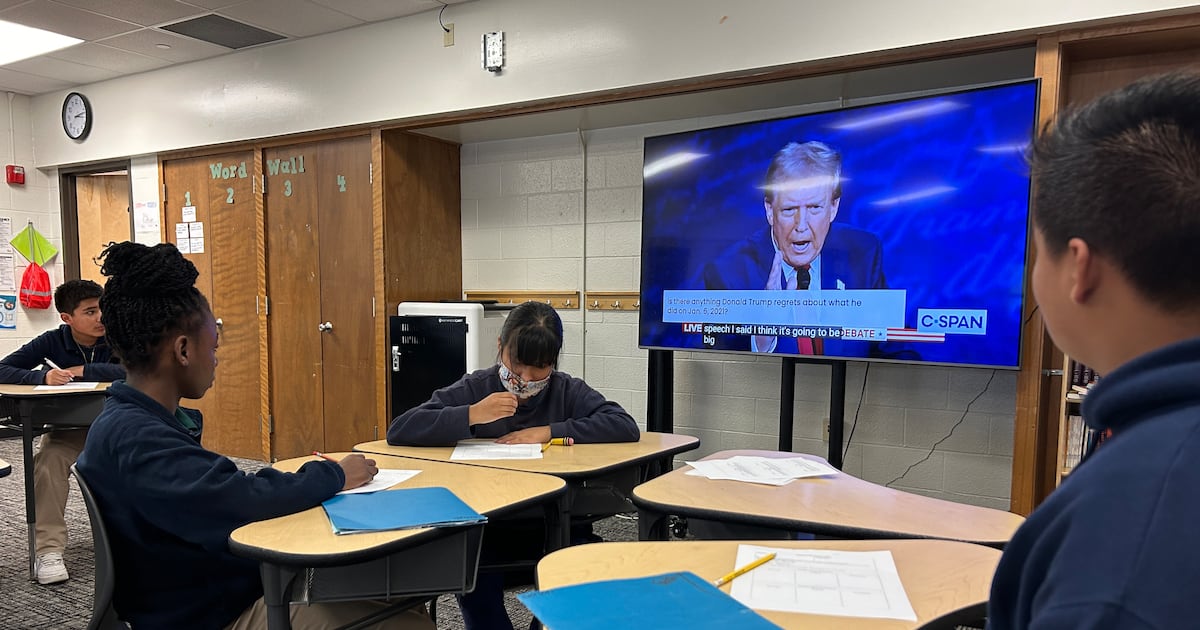- Coffee Fiix
- Posts
- Oklahoma Prepares to Enact Project 2025
Oklahoma Prepares to Enact Project 2025
And the USDA banning processing fees for lower-income families

Good Day,
We wanted to remain upbeat for this coming issue, but there are a couple of important issues that we need to discuss. If you are an educator or plan to become an educator, this can have some pretty devasting impacts to your livelihood. Whether this is a good or bad thing, it just depends where on the political spectrum you lie, but here we would say it is clearly the latter.
Cheers ☕
In today’s newsletter
Oklahoma Education Superintendent pushes for department of education Dismantling in Bold Pre-2025 Memo
USDA bans processing fees for reduced school meal programs starting 2027, impacting millions of low-income families
A school shooting thwarted, California preparing for another Trump presidency, students receiving racist text messages, and Tennessee continuing battle of how public funds for schools should be used.
Walters’ memo emphasizing “local” control on schools

U.S. Department of Education
For those who have been keeping up with our newsletter, Ryan Walters is a name you have heard before. If not, here is a quick recap: he is a big Donald Trump supporter and has been pushing to mandate that teachers teach the Bible in public classrooms. That’s the gist of it.
Walters sent out a memo on Thursday making it clear that he expects the Department of Education to be dismantled under the directive of the new presidency, probably due to what is outlined in Project 2025, which clearly states that it is targeting eliminating the DOE along with eliminating Title I funding.
This is what Walters outlined in the memo he sent out:
Championing Parents’ Rights: The Biden administration labeled parents as threats and tried to silence their concerns. States, when restored control, will ensure parents’ voices are not just heard but respected.
Ending Social Indoctrination in Classrooms: Federal funds have been used to force radical agendas, like promoting boys in girls' sports and pushing divisive gender and racial ideologies. With block grants, states can reject these mandates and focus on real education over propaganda.
Protecting Patriotism in Curriculum: Schools are pressured to teach books that undermine American values and ignore the truth about American history. By removing federal overreach, states can make sure students learn a patriotic curriculum that respects our country and honors our shared heritage.
Stopping Illegal Immigration’s Impact on Schools: Open border policies flood schools with unregulated demands, stretching resources meant for American kids. States, free from federal overreach, could manage these impacts in ways that protect classrooms and prioritize their communities.
Blocking Foreign Influence in Our Schools: Federal policies tie funding to outside agendas, allowing China and other adversaries to infiltrate our education system. Without federal strings, states could reject foreign interference and ensure schools promote only American values.
It is clear what Walters' agenda is and what he wants to see in the public school system. If you are an educator and you read this, do you believe what he is saying is justified? Most teachers are simply trying to do their best. With the pay they receive compared to their more compensated, professional counterparts, teachers do not have time to impose any agenda or indoctrination scheme on students. They are there in the classroom to ensure students develop the necessary skills and tools to be successful and productive citizens as they age. There is no question that there are many issues with the U.S. public school system, and dismantling the DOE will only exacerbate the decline in our education system.
There will be more to unpack, especially in the months after the new administration takes over on January 20, 2025.
No more processing fees

Students cheer as Gov. Tim Walz finishes signing the free school meals bill, on Friday, which will cost the state of Minnesota close to $400 million in the first two years and grow in price in the future. - Ben Hovland | MPR News
Beginning in 2027, schools nationwide will no longer be allowed to charge students on reduced meal plan processing fees. Those processing fees add up. The law stipulates that students on reduced meal plans cannot be charged more than 30 cents for breakfast and 40 cents for lunch. Yet, schools have to work with processing companies to manage these charges, and these companies are entitled to a cut for providing their services.
The cut these processing companies receive is 10 times the amount students are charged. That means that a 30-cent breakfast is not $3.00. Even though parents can pay with cash or check to avoid fees, these two methods can be inconvenient, especially for families with two working parents who are under the poverty line, which qualifies them for reduced meals.
The USDA aims to lower the cost of families whose income is 185% of the federal poverty line — that comes out to $57,720 for a family of four. Agriculture Secretary Tom Vilsack stated, "While today's action to eliminate extra fees for lower-income households is a major step in the right direction, the most equitable path forward is to offer every child access to healthy school meals at no cost. We will continue to work with Congress to move toward that goal so all kids have the nutrition they need to reach their full potential."
According to the Consumer Financial Protection Bureau (CFPB), when they reviewed 300 of the largest U.S. public schools, 87% of schools contracted with payment processor companies, and on average, the companies charged $2.37 per transaction. Joanna Roa, a library specialist at Clemson University, stated that when her son was in first grade, the transaction fee was $3.25. "A dollar here and there, I expected…but $3.25 per transaction, especially here in rural South Carolina where the cost of living is a lot lower — as are the salaries — is a lot."
Harkening back to what Agriculture Secretary Tom Vilsack stated about working toward giving all students access to healthy meals at no cost, it should be a no-brainer that what we need in this country is universal free meals for all students.
Unfortunately, this might pose a challenge in the next several years.
The Final Minute
Parents in Kenosha County faced every parent's worst nightmare on Thursday morning when they received notification that a 13-year-old boy had entered Roosevelt Elementary School with a weapon, prompting an immediate lockdown that left many parents anxiously waiting outside the building. The incident, which resulted in the suspect's arrest Thursday afternoon, drew a significant police presence including helicopter support, while parents like Alyssa Clark rushed from work to be near the school, stating, "Couldn't hug them tight enough... This is the reality shock." In the aftermath of the incident, Kenosha parents are calling for enhanced safety measures at schools, with parent Nicole Olsen expressing her sadness that such security20 threats have become part of their children's educational experience.
The recent presidential election results have triggered widespread concern among California students and families, particularly after Donald Trump's victory sparked fears about potential mass deportations and cuts to school funding in states protecting transgender students and promoting diversity initiatives. For students like Alejandra Lopez, a second-year political science student at Cal Poly Pomona whose parents are undocumented immigrants, the election outcome feels deeply personal, with Lopez expressing anger at Trump's re-election and his continued rhetoric targeting immigrant communities. California education leaders and advocates, while acknowledging these fears as legitimate, are emphasizing the state's existing protective policies, including AB 699 which was passed in 2017 to shield immigrant students, and the 1982 Supreme Court ruling in Plyler vs. Doe that guarantees all children access to public education regardless of immigration status. State Attorney General Rob Bonta has indicated that California is better prepared this time, stating, "Fortunately, and unfortunately, we have four years of Trump 1.0 under our belts. We know what to expect, and we won't be caught flat-footed."
In multiple school districts across Montgomery and Delaware counties in Pennsylvania, middle and high school students are receiving racist and derogatory text messages from various phone numbers, prompting administrators from Lower Merion, Cheltenham, and Upper Darby school districts to alert parents and local law enforcement. Acting Superintendent Megan E. Shafer of Lower Merion School District reported that at least six middle school students received these messages, while similar incidents have been documented in other states with texts originating from area codes in Virginia, Florida, South Carolina, Texas, and California, many using the TextNow service provider. The affected school districts are taking a unified stance against the racist messages, with administrators emphasizing that such behavior targeting children is particularly disturbing and won't be tolerated, though the source of the messages remains unknown as investigations continue.
When it comes to Tennessee's latest educational controversy, Republican leaders have unified behind a new universal school voucher bill that would provide $7,075 in public funding for up to 20,000 students to attend private schools, accompanied by a one-time $2,000 bonus for public school teachers and allocation of sports betting revenue for school construction needs. Governor Bill Lee, who saw his previous voucher bill fail seven months ago, is making this his top legislative priority for 2025, despite recent ballot measures in Colorado, Kentucky, and Nebraska showing voters' wariness of spending public dollars on private schools. The proposal faces opposition from both rural Republicans concerned about potential funding losses and Democrats like Sen. Jeff Yarbro, who argues that similar programs in other states primarily benefit families already paying for private school, while supporters maintain that state funding for districts won't decrease if students leave their public schools to participate in the program.
Closing Bell
Take a Break
On this day in 1969…
Sesame Street premiered on PBS. That means Sesame Street is 55 years old and has aired over 4,700 episodes. This makes it one of the longest running television series in history.




Reply